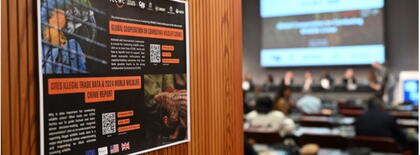The International Consortium on Combating Wildlife Crime (ICCWC) today further strengthened its efforts by launching the ICCWC Strategic Mission 2014-2016. The document sets out the consortium’s diverse agenda to combat wildlife and forest crime, providing the first strategic framework for the consortium’s activities and future directions since its establishment in late 2010.
The ICCWC Strategic Mission 2014-16 outlines five focus areas to be simultaneously pursued by the consortium – strengthening cooperation and coordination, analysing current responses to wildlife and forest crime, building national enforcement capacity, raising awareness and political support, and improving the use of knowledge and innovation in responses to wildlife and forest crime.
Each focus area is supported by a number of strategies that will guide the type of activities to be pursued by ICCWC over the next three years. These highlight the broad range of activities that are required to combat wildlife crime, along with the need for further donor support for on-ground action and national capacity-building in response to these crimes.
ICCWC is a partnership between the Convention on International Trade in Endangered Species of Wild Fauna and Flora (CITES) Secretariat, INTERPOL, the United Nations Office on Drugs and Crime, the World Bank and the World Customs Organization. The consortium was established in response to the increasingly organized and transnational nature of wildlife and forest crime, and the recognition of the need to deliver a more coordinated global enforcement response.
The ICCWC Strategic Mission 2014-16 and other information on the consortium’s activities, including an Annual Report on their operations for 2013, can be obtained from the ICCWC web portal at /eng/prog/ICCWC.php.




